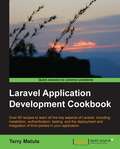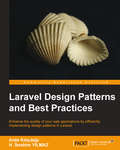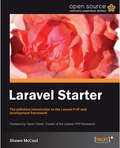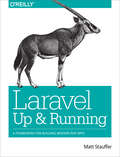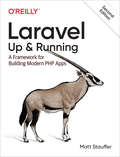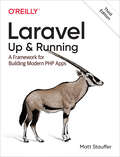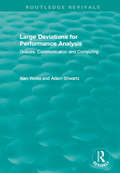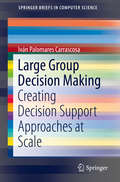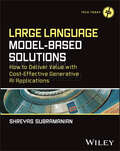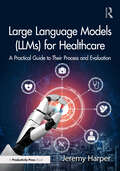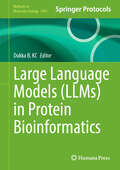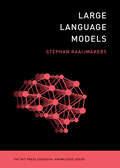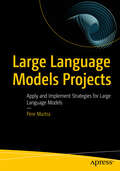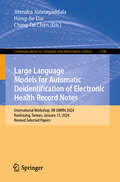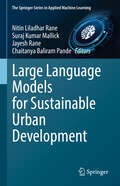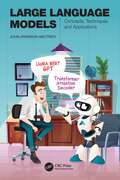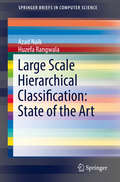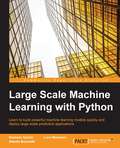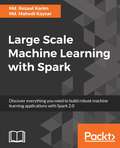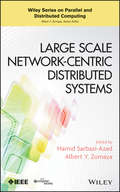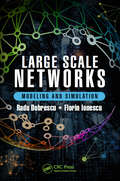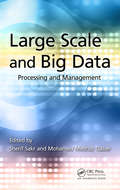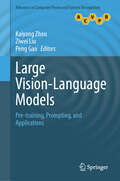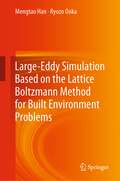- Table View
- List View
Laravel Application Development Cookbook
by Terry MatulaGet to grips with a new technology, understand what it is and what it can do for you, and then get to work with the most important features and tasks.A short and precise guide to get you started with EaselJS , helping you to create some cool applications and games.EaselJS greatly simplifies application development in HTML5 Canvas using a syntax and an architecture very similar to the ActionScript 3.0 language. As a result, Flash / Flex developers will immediately feel at home but it's very easy to learn even if you've never opened Flash in your life. The book targets Web designers, animators, Digital content producers, and Flash and Flex developers.
Laravel Design Patterns and Best Practices
by Arda Kilicdagi H. Ibrahim YilmazThis book is a practical guide packed with clear examples that will help you get to grips with the best practices in Laravel design patterns to create advanced web applications. This book is intended for web application developers working with Laravel who want to increase the efficiency of their web applications. It assumes that you have some experience with the Laravel PHP framework and are familiar with coding OOP methods.
Laravel Starter
by Shawn MccoolThis book is a practical, task-based, step-by-step tutorial that demonstrates topics ranging from MVC code-separation, to code-modularity, to utilizing ActiveRecord for data abstraction which are explained from the ground-up to provide a strong framework of understanding for creating professional web-applications with Laravel. This book is ideal for programmers familiar with PHP who are interested in learning the Laravel way of solving the common problems faced in their day to day work.
Laravel: A Framework for Building Modern PHP Apps
by Matt StaufferWhat sets Laravel apart from other PHP web frameworks? Speed and simplicity, for starters. This rapid application development framework and its vast ecosystem of tools let you quickly build new sites and applications with clean, readable code. With this practical guide, Matt Stauffer--a leading teacher and developer in the Laravel community--provides the definitive introduction to one of today's most popular web frameworks.The book's high-level overview and concrete examples will help experienced PHP web developers get started with Laravel right away. By the time you reach the last page, you should feel comfortable writing an entire application in Laravel from scratch.Dive into several features of this framework, including:Blade, Laravel's powerful, custom templating toolTools for gathering, validating, normalizing, and filtering user-provided dataLaravel's Eloquent ORM for working with the application's databasesThe Illuminate request object, and its role in the application lifecyclePHPUnit, Mockery, and PHPSpec for testing your PHP codeLaravel's tools for writing JSON and RESTful APIsInterfaces for file system access, sessions, cookies, caches, and searchTools for implementing queues, jobs, events, and WebSocket event publishingLaravel's specialty packages: Scout, Passport, Cashier, Echo, Elixir, Valet, and Socialite
Laravel: A Framework for Building Modern PHP Apps
by Matt StaufferWhat sets Laravel apart from other PHP web frameworks? Speed and simplicity, for starters. This rapid application development framework and its vast ecosystem of tools let you quickly build new sites and applications with clean, readable code. Fully updated to cover Laravel 5.8, the latest release, the second edition of this practical guide provides the definitive introduction to one of today’s most popular web frameworks.Matt Stauffer—a leading teacher and developer in the Laravel community—delivers a high-level overview and concrete examples to help experienced PHP web developers get started with Laravel right away. By the time you reach the last page, you should feel comfortable writing an entire application in Laravel from scratch.
Laravel: Up & Running
by Matt StaufferWhat sets Laravel apart from other PHP web frameworks? Speed and simplicity, for starters. This rapid application development framework and its ecosystem of tools let you quickly build new sites and applications with clean, readable code. Fully updated to include Laravel 10, the third edition of this practical guide provides the definitive introduction to one of today's most popular web frameworks.Matt Stauffer, a leading teacher and developer in the Laravel community, delivers a high-level overview and concrete examples to help experienced PHP web developers get started with this framework right away. This updated edition covers the entirely new auth and frontend tooling and other first-party tools introduced since the second edition.Dive into features, including:Blade, Laravel's powerful custom templating toolTools for gathering, validating, normalizing, and filtering user-provided dataThe Eloquent ORM for working with application databasesThe Illuminate request object and its role in the application lifecyclePHPUnit, Mockery, and Dusk for testing your PHP codeTools for writing JSON and RESTful APIsInterfaces for filesystem access, sessions, cookies, caches, and searchTools for implementing queues, jobs, events, and WebSocket event publishingSpecialty packages including Scout, Passport, Cashier, and more
Large Deviations For Performance Analysis: Queues, Communication and Computing (Routledge Revivals)
by Alan Weiss Adam ShwartzOriginally published in 1995, Large Deviations for Performance Analysis consists of two synergistic parts. The first half develops the theory of large deviations from the beginning, through recent results on the theory for processes with boundaries, keeping to a very narrow path: continuous-time, discrete-state processes. By developing only what is needed for the applications, the theory is kept to a manageable level, both in terms of length and in terms of difficulty. Within its scope, the treatment is detailed, comprehensive and self-contained. As the book shows, there are sufficiently many interesting applications of jump Markov processes to warrant a special treatment. The second half is a collection of applications developed at Bell Laboratories. The applications cover large areas of the theory of communication networks: circuit switched transmission, packet transmission, multiple access channels, and the M/M/1 queue. Aspects of parallel computation are covered as well including, basics of job allocation, rollback-based parallel simulation, assorted priority queueing models that might be used in performance models of various computer architectures, and asymptotic coupling of processors. These applications are thoroughly analysed using the tools developed in the first half of the book.
Large Group Decision Making: Creating Decision Support Approaches at Scale (SpringerBriefs in Computer Science)
by Iván Palomares CarrascosaThis SpringerBrief provides a pioneering, central point of reference for the interested reader in Large Group Decision Making trends such as consensus support, fusion and weighting of relevant decision information, subgroup clustering, behavior management, and implementation of decision support systems, among others. Based on the challenges and difficulties found in classical approaches to handle large decision groups, the principles, families of techniques, and newly related disciplines to Large-Group Decision Making (such as Data Science, Artificial Intelligence, Social Network Analysis, Opinion Dynamics, Behavioral and Cognitive Sciences), are discussed. Real-world applications and future directions of research on this novel topic are likewise highlighted.
Large Language Model-Based Solutions: How to Deliver Value with Cost-Effective Generative AI Applications (Tech Today)
by Shreyas SubramanianLearn to build cost-effective apps using Large Language Models In Large Language Model-Based Solutions: How to Deliver Value with Cost-Effective Generative AI Applications, Principal Data Scientist at Amazon Web Services, Shreyas Subramanian, delivers a practical guide for developers and data scientists who wish to build and deploy cost-effective large language model (LLM)-based solutions. In the book, you'll find coverage of a wide range of key topics, including how to select a model, pre- and post-processing of data, prompt engineering, and instruction fine tuning. The author sheds light on techniques for optimizing inference, like model quantization and pruning, as well as different and affordable architectures for typical generative AI (GenAI) applications, including search systems, agent assists, and autonomous agents. You'll also find: Effective strategies to address the challenge of the high computational cost associated with LLMs Assistance with the complexities of building and deploying affordable generative AI apps, including tuning and inference techniques Selection criteria for choosing a model, with particular consideration given to compact, nimble, and domain-specific models Perfect for developers and data scientists interested in deploying foundational models, or business leaders planning to scale out their use of GenAI, Large Language Model-Based Solutions will also benefit project leaders and managers, technical support staff, and administrators with an interest or stake in the subject.
Large Language Models (LLMs) for Healthcare: A Practical Guide to Their Process and Evaluation
by Jeremy HarperIn today’s rapidly evolving healthcare environment, one technology stands at the forefront of innovation: large language models (LLMs). Far more than a fleeting hype, LLMs represent a foundational shift in how healthcare professionals interact with and derive value from data. From simplifying clinical note-writing to supporting patient engagement and enhancing administrative processes, LLMs have the power to transform nearly every corner of the healthcare ecosystem. In Large Language Models (LLMs) for Healthcare, Jeremy Harper shines a spotlight on this transformative potential. With clarity and practicality, he explores how these advanced artificial intelligence (AI) tools can reshape clinical workflows, optimize administrative tasks, and ultimately create a more responsive, patient-centered model of care. Over the course of this book, you will discover new opportunities—learn how LLMs can reduce manual documentation burdens, provide intelligent summaries of complex patient histories, and offer real-time translations of clinical jargon; understand the fundamentals—grasp what LLMs are, how they work, and why they can handle vast amounts of clinical text more effectively than previous AI tools; examine key use cases—from automated billing support and smart note generation to patient triage and ethical telehealth consultations; address risks and realities—gain insight into challenges such as "hallucinations," inherent bias, and the critical importance of patient privacy; plan for implementation—explore strategies for prompt engineering, fine-tuning, and rigorous evaluation of LLM solutions; and envision the future – glimpse how LLMs might revolutionize healthcare through enhanced back-office operations and cutting-edge clinical decision support.
Large Language Models (Methods in Molecular Biology #2941)
by Dukka B. KcThis book presents a comprehensive collection of methods, resources, and studies that use large language models (LLMs) in the field of protein bioinformatics. Reflecting the swift pace of LLM development today, the volume delves into numerous LLM-based tools to investigate proteins science, from protein language models to the prediction of protein-ligand binding sites. Written for the highly successful Methods in Molecular Biology series, chapters include the kind of detailed implementation advice to ensure success in future research. Authoritative and practical, Large Language Models (LLMs) in Protein Bioinformatics serves as an ideal guide for scientists seeking to tap into the potential of artificial intelligence in this vital area of biological study.
Large Language Models (The MIT Press Essential Knowledge series)
by Stephan RaaijmakersAn in-depth history of Large Language Models—and what their ubiquity, disruption, and creativity mean from a wider sociopolitical perspective.In November 2022, ChatGPT swept the globe with a mixed frenzy of excitement and anxiety. Was this a step closer to reaching singularity or just another marvel in machine learning? Author Stephan Raaijmakers provides a comprehensive introduction to Large Language Models (LLMs), describing what exactly they are capable of from a technical and creative standpoint. This concise volume covers everything from the architecture of LLM neural networks to the limitations of LLMs to how our governments can regulate this technology. In explaining how exactly LLMs learn from data sets, Raaijmakers defangs the more sensational arguments we may be familiar with. Instead, he offers a more grounded approach to how this groundbreaking—and increasingly ubiquitous—form of artificial intelligence will shape our society for years to come.
Large Language Models Ops for Finance: A Practical Guide to Infrastructure, Implementation, and Innovation
by Brindha Priyadarshini JeyaramanExplore emerging technologies and the evolving role of AI in finance. Geared toward finance professionals, this book will equip you with the knowledge and tools to harness the power of Large Language Models (LLMs), ensuring you stay ahead in an increasingly AI-driven industry. Highlighting the benefits and challenges of LLMs in financial contexts, the book starts with the necessary infrastructure setup, covering both hardware and software requirements. It offers a balanced discussion on cloud versus on-premises solutions, enabling you to make informed decisions based on their specific needs. Training and fine-tuning LLMs are critical components of effective deployment, and this book offers best practices, from data preparation to advanced fine-tuning techniques. It also delves into deployment strategies, with practical advice on building deployment pipelines, monitoring performance, and optimizing operations. Ensuring data privacy and security is paramount in finance, so you&’ll take a close look at maintaining compliance with regulations while safeguarding sensitive information. You&’ll also examine the integration of LLMs into existing financial systems, with real-world case studies and strategies for API development and real-time data processing. Monitoring and maintenance are crucial for long-term success, and the book outlines how to manage performance metrics, handle model drift, and ensure regular updates. Large Language Models Ops for Finance is your essential guide to discovering the transformative potential of LLMs in the finance industry. What You Will Learn ● Review LLMs and their applications in finance. ● <span lang="EN-IN" style="font-size: 12.0pt; font-family: 'Times New
Large Language Models Projects: Apply and Implement Strategies for Large Language Models
by Pere MartraThis book offers you a hands-on experience using models from OpenAI and the Hugging Face library. You will use various tools and work on small projects, gradually applying the new knowledge you gain. The book is divided into three parts. Part one covers techniques and libraries. Here, you'll explore different techniques through small examples, preparing to build projects in the next section. You'll learn to use common libraries in the world of Large Language Models. Topics and technologies covered include chatbots, code generation, OpenAI API, Hugging Face, vector databases, LangChain, fine tuning, PEFT fine tuning, soft prompt tuning, LoRA, QLoRA, evaluating models, and Direct Preference Optimization. Part two focuses on projects. You'll create projects, understanding design decisions. Each project may have more than one possible implementation, as there is often not just one good solution. You'll also explore LLMOps-related topics. Part three delves into enterprise solutions. Large Language Models are not a standalone solution; in large corporate environments, they are one piece of the puzzle. You'll explore how to structure solutions capable of transforming organizations with thousands of employees, highlighting the main role that Large Language Models play in these new solutions. This book equips you to confidently navigate and implement Large Language Models, empowering you to tackle diverse challenges in the evolving landscape of language processing. What You Will Learn Gain practical experience by working with models from OpenAI and the Hugging Face library Use essential libraries relevant to Large Language Models, covering topics such as Chatbots, Code Generation, OpenAI API, Hugging Face, and Vector databases Create and implement projects using LLM while understanding the design decisions involved Understand the role of Large Language Models in larger corporate settings Who This Book Is For Data analysts, data science, Python developers, and software professionals interested in learning the foundations of NLP, LLMs, and the processes of building modern LLM applications for various tasks
Large Language Models for Automatic Deidentification of Electronic Health Record Notes: International Workshop, IW-DMRN 2024, Kaohsiung, Taiwan, January 15, 2024, Revised Selected Papers (Communications in Computer and Information Science #2148)
by Jitendra Jonnagaddala Hong-Jie Dai Ching-Tai ChenThis volume constitutes the refereed proceedings of the International Workshop on Deidentification of Electronic Health Record Notes, IW-DMRN 2024, held on January 15, 2024, in Kaohsiung, Taiwan. The 15 full papers were carefully reviewed and selected from 30 submissions. The conference focuses on medical data analysis, enhancing medication safety, and optimizing medical care efficiency.
Large Language Models for Sustainable Urban Development (The Springer Series in Applied Machine Learning)
by Chaitanya Baliram Pande Nitin Liladhar Rane Suraj Kumar Mallick Jayesh RaneWith rapid urbanization defining the 21st Century, cities face mounting challenges in achieving sustainability, equity, and functionality. This book explores how innovative technologies such as Artificial Intelligence (AI) and Large Language Models (LLMs) can transform urban development by offering intelligent, data-driven solutions. LLMs go beyond automation, acting as co-creators in addressing environmental sustainability, resource management, and equitable development. By analyzing regulations, best practices, and real-time data on phenomena such as air pollution and traffic, these models empower urban planners to design smarter, more sustainable cities while fostering collaboration across disciplines. Divided into five sections, the book explores the diverse applications of LLMs, from optimizing renewable energy systems and enhancing urban planning to revolutionizing construction practices and improving resource efficiency. It highlights case studies on integrating AI with smart infrastructure, ecological balance, and disaster resilience. While underscoring their transformative potential, the book also examines ethical considerations such as bias, privacy, and environmental impact. More than a collection of research, this work is a call to action for urban planners, data scientists, policymakers, and researchers to harness AI responsibly in building greener, more equitable urban futures.
Large Language Models: Concepts, Techniques and Applications
by John Atkinson-AbutridyThis book serves as an introduction to the science and applications of Large Language Models (LLMs). You'll discover the common thread that drives some of the most revolutionary recent applications of artificial intelligence (AI): from conversational systems like ChatGPT or BARD, to machine translation, summary generation, question answering, and much more.At the heart of these innovative applications is a powerful and rapidly evolving discipline, natural language processing (NLP). For more than 60 years, research in this science has been focused on enabling machines to efficiently understand and generate human language. The secrets behind these technological advances lie in LLMs, whose power lies in their ability to capture complex patterns and learn contextual representations of language. How do these LLMs work? What are the available models and how are they evaluated? This book will help you answer these and many other questions. With a technical but accessible introduction: You will explore the fascinating world of LLMs, from its foundations to its most powerful applications You will learn how to build your own simple applications with some of the LLMs Designed to guide you step by step, with six chapters combining theory and practice, along with exercises in Python on the Colab platform, you will master the secrets of LLMs and their application in NLP.From deep neural networks and attention mechanisms, to the most relevant LLMs such as BERT, GPT-4, LLaMA, Palm-2 and Falcon, this book guides you through the most important achievements in NLP. Not only will you learn the benchmarks used to evaluate the capabilities of these models, but you will also gain the skill to create your own NLP applications. It will be of great value to professionals, researchers and students within AI, data science and beyond.
Large Scale Hierarchical Classification: State of the Art (SpringerBriefs in Computer Science)
by Huzefa Rangwala Azad NaikThis SpringerBrief covers the technical material related to large scale hierarchical classification (LSHC). HC is an important machine learning problem that has been researched and explored extensively in the past few years. In this book, the authors provide a comprehensive overview of various state-of-the-art existing methods and algorithms that were developed to solve the HC problem in large scale domains. Several challenges faced by LSHC is discussed in detail such as: 1. High imbalance between classes at different levels of the hierarchy 2. Incorporating relationships during model learning leads to optimization issues 3. Feature selection 4. Scalability due to large number of examples, features and classes 5. Hierarchical inconsistencies 6. Error propagation due to multiple decisions involved in making predictions for top-down methods The brief also demonstrates how multiple hierarchies can be leveraged for improving the HC performance using different Multi-Task Learning (MTL) frameworks. The purpose of this book is two-fold: 1. Help novice researchers/beginners to get up to speed by providing a comprehensive overview of several existing techniques. 2. Provide several research directions that have not yet been explored extensively to advance the research boundaries in HC. New approaches discussed in this book include detailed information corresponding to the hierarchical inconsistencies, multi-task learning and feature selection for HC. Its results are highly competitive with the state-of-the-art approaches in the literature.
Large Scale Machine Learning with Python
by Alberto Boschetti Luca Massaron Bastiaan SjardinLearn to build powerful machine learning models quickly and deploy large-scale predictive applications About This Book * Design, engineer and deploy scalable machine learning solutions with the power of Python * Take command of Hadoop and Spark with Python for effective machine learning on a map reduce framework * Build state-of-the-art models and develop personalized recommendations to perform machine learning at scale Who This Book Is For This book is for anyone who intends to work with large and complex data sets. Familiarity with basic Python and machine learning concepts is recommended. Working knowledge in statistics and computational mathematics would also be helpful. What You Will Learn * Apply the most scalable machine learning algorithms * Work with modern state-of-the-art large-scale machine learning techniques * Increase predictive accuracy with deep learning and scalable data-handling techniques * Improve your work by combining the MapReduce framework with Spark * Build powerful ensembles at scale * Use data streams to train linear and non-linear predictive models from extremely large datasets using a single machine In Detail Large Python machine learning projects involve new problems associated with specialized machine learning architectures and designs that many data scientists have yet to tackle. But finding algorithms and designing and building platforms that deal with large sets of data is a growing need. Data scientists have to manage and maintain increasingly complex data projects, and with the rise of big data comes an increasing demand for computational and algorithmic efficiency. Large Scale Machine Learning with Python uncovers a new wave of machine learning algorithms that meet scalability demands together with a high predictive accuracy. Dive into scalable machine learning and the three forms of scalability. Speed up algorithms that can be used on a desktop computer with tips on parallelization and memory allocation. Get to grips with new algorithms that are specifically designed for large projects and can handle bigger files, and learn about machine learning in big data environments. We will also cover the most effective machine learning techniques on a map reduce framework in Hadoop and Spark in Python. Style and approach This efficient and practical title is stuffed full of the techniques, tips and tools you need to ensure your large scale Python machine learning runs swiftly and seamlessly. Large-scale machine learning tackles a different issue to what is currently on the market. Those working with Hadoop clusters and in data intensive environments can now learn effective ways of building powerful machine learning models from prototype to production. This book is written in a style that programmers from other languages (R, Julia, Java, Matlab) can follow.
Large Scale Machine Learning with Spark
by Md. Mahedi Kaysar Md. Rezaul KarimDiscover everything you need to build robust machine learning applications with Spark 2.0 About This Book * Get the most up-to-date book on the market that focuses on design, engineering, and scalable solutions in machine learning with Spark 2.0.0 * Use Spark's machine learning library in a big data environment * You will learn how to develop high-value applications at scale with ease and a develop a personalized design Who This Book Is For This book is for data science engineers and scientists who work with large and complex data sets. You should be familiar with the basics of machine learning concepts, statistics, and computational mathematics. Knowledge of Scala and Java is advisable. What You Will Learn * Get solid theoretical understandings of ML algorithms * Configure Spark on cluster and cloud infrastructure to develop applications using Scala, Java, Python, and R * Scale up ML applications on large cluster or cloud infrastructures * Use Spark ML and MLlib to develop ML pipelines with recommendation system, classification, regression, clustering, sentiment analysis, and dimensionality reduction * Handle large texts for developing ML applications with strong focus on feature engineering * Use Spark Streaming to develop ML applications for real-time streaming * Tune ML models with cross-validation, hyperparameters tuning and train split * Enhance ML models to make them adaptable for new data in dynamic and incremental environments In Detail Data processing, implementing related algorithms, tuning, scaling up and finally deploying are some crucial steps in the process of optimising any application. Spark is capable of handling large-scale batch and streaming data to figure out when to cache data in memory and processing them up to 100 times faster than Hadoop-based MapReduce. This means predictive analytics can be applied to streaming and batch to develop complete machine learning (ML) applications a lot quicker, making Spark an ideal candidate for large data-intensive applications. This book focuses on design engineering and scalable solutions using ML with Spark. First, you will learn how to install Spark with all new features from the latest Spark 2.0 release. Moving on, you'll explore important concepts such as advanced feature engineering with RDD and Datasets. After studying developing and deploying applications, you will see how to use external libraries with Spark. In summary, you will be able to develop complete and personalised ML applications from data collections,model building, tuning, and scaling up to deploying on a cluster or the cloud. Style and approach This book takes a practical approach where all the topics explained are demonstrated with the help of real-world use cases.
Large Scale Network-Centric Distributed Systems
by Albert Y. Zomaya Hamid Sarbazi-AzadA highly accessible reference offering a broad range of topics and insights on large scale network-centric distributed systemsEvolving from the fields of high-performance computing and networking, large scale network-centric distributed systems continues to grow as one of the most important topics in computing and communication and many interdisciplinary areas. Dealing with both wired and wireless networks, this book focuses on the design and performance issues of such systems.Large Scale Network-Centric Distributed Systems provides in-depth coverage ranging from ground-level hardware issues (such as buffer organization, router delay, and flow control) to the high-level issues immediately concerning application or system users (including parallel programming, middleware, and OS support for such computing systems). Arranged in five parts, it explains and analyzes complex topics to an unprecedented degree:Part 1: Multicore and Many-Core (Mc) Systems-on-ChipPart 2: Pervasive/Ubiquitous Computing and Peer-to-Peer SystemsPart 3: Wireless/Mobile NetworksPart 4: Grid and Cloud ComputingPart 5: Other Topics Related to Network-Centric Computing and Its ApplicationsLarge Scale Network-Centric Distributed Systems is an incredibly useful resource for practitioners, postgraduate students, postdocs, and researchers.
Large Scale Networks: Modeling and Simulation
by Radu Dobrescu Florin IonescuThis book offers a rigorous analysis of the achievements in the field of traffic control in large networks, oriented on two main aspects: the self-similarity in traffic behaviour and the scale-free characteristic of a complex network. Additionally, the authors propose a new insight in understanding the inner nature of things, and the cause-and-effect based on the identification of relationships and behaviours within a model, which is based on the study of the influence of the topological characteristics of a network upon the traffic behaviour. The effects of this influence are then discussed in order to find new solutions for traffic monitoring and diagnosis and also for traffic anomalies prediction. Although these concepts are illustrated using highly accurate, highly aggregated packet traces collected on backbone Internet links, the results of the analysis can be applied for any complex network whose traffic processes exhibit asymptotic self-similarity, perceived as an adaptability of traffic in networks. However, the problem with self-similar models is that they are computationally complex. Their fitting procedure is very time-consuming, while their parameters cannot be estimated based on the on-line measurements. In this aim, the main objective of this book is to discuss the problem of traffic prediction in the presence of self-similarity and particularly to offer a possibility to forecast future traffic variations and to predict network performance as precisely as possible, based on the measured traffic history.
Large Scale and Big Data: Processing and Management
by Mohamed Medhat Gaber Sherif SakrLarge Scale and Big Data: Processing and Management provides readers with a central source of reference on the data management techniques currently available for large-scale data processing. Presenting chapters written by leading researchers, academics, and practitioners, it addresses the fundamental challenges associated with Big Data processing t
Large Vision-Language Models: Pre-training, Prompting, and Applications (Advances in Computer Vision and Pattern Recognition)
by Kaiyang Zhou Ziwei Liu Peng GaoThe rapid progress in the field of large multimodal foundation models, especially vision-language models, has dramatically transformed the landscape of machine learning, computer vision, and natural language processing. These powerful models, trained on vast amounts of multimodal data mixed with images and text, have demonstrated remarkable capabilities in tasks ranging from image classification and object detection to visual content generation and question answering. This book provides a comprehensive and up-to-date exploration of large vision-language models, covering the key aspects of their pre-training, prompting techniques, and diverse real-world computer vision applications. It is an essential resource for researchers, practitioners, and students in the fields of computer vision, natural language processing, and artificial intelligence. Large Vision-Language Models begins by exploring the fundamentals of large vision-language models, covering architectural designs, training techniques, and dataset construction methods. It then examines prompting strategies and other adaptation methods, demonstrating how these models can be effectively fine-tuned to address a wide range of downstream tasks. The final section focuses on the application of vision-language models across various domains, including open-vocabulary object detection, 3D point cloud processing, and text-driven visual content generation and manipulation. Beyond the technical foundations, the book explores the wide-ranging applications of vision-language models (VLMs), from enhancing image recognition systems to enabling sophisticated visual content generation and facilitating more natural human-machine interactions. It also addresses key challenges in the field, such as feature alignment, scalability, data requirements, and evaluation metrics. By providing a comprehensive roadmap for both newcomers and experts, this book serves as a valuable resource for understanding the current landscape, limitations, and future directions of VLMs, ultimately contributing to the advancement of artificial intelligence.
Large-Eddy Simulation Based on the Lattice Boltzmann Method for Built Environment Problems
by Mengtao Han Ryozo OokaThis book details the lattice Boltzmann method (LBM) applied to the built environment problems. It provides the fundamental theoretical knowledge and specific implementation methods of LBM from the engineering perspective of the built environment. It covers comprehensive issues of built environment with three detailed cases, solving practical problems. It can be used as a reference book for teachers, students, and engineering technicians to study LBM and conduct architecture and urban wind environments simulations, in the fields of architecture, building technology science, urban planning, HVAC, built environment engineering, and civil engineering.
